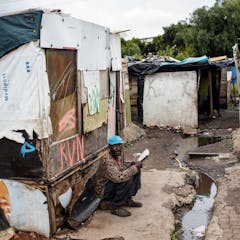
Articles on Public health
Displaying 81 - 100 of 2115 articles

Rates of flu vaccination are down for children. That leaves them and us vulnerable to the flu and its complications.

Africa contributes less than 1% of research worldwide on movement behaviours in children. This means that research on movement behaviours has largely excluded over 16% of the world’s population.

Demand for human organs has surpassed supply. This is leading to serious problems including a flourishing black market for organ trafficking.

People in disadvantaged communities are less likely to access COVID antivirals. That needs to change.

Health workers with relatives in positions of power were frequently absent from work.

One day we’ll look back in amazement that wood heaters were once tolerated in cities right next to houses, schools and hospitals.

Over the last two years, routine immunisation services and coverage of essential childhood vaccines have been disrupted.

Good legislation has been undermined by poor planning, limited investment and governance, but recent water reports suggest the government recognises the scale of the problems.

The vulnerability of migrants was highlighted during the COVID-19 pandemic when restrictions affected people’s ability to travel to access treatment.

Flu vaccines remain the most effective method available to prevent flu illness, especially severe illness.

Millions of people worldwide are exposed via soil and water to arsenic, whether naturally occurring or related to pollution. Chronic exposure is linked to the formation of cancer stem cells.

Although testing for CMV during pregnancy isn’t routine and there isn’t universal screening for infants, there are steps pregnant people can take to protect themselves and their newborns.

The argument that private healthcare relieves pressure on the public system is misleading. Private care profits from failures of the public system and patients’ desperation for timely treatment.

Alcohol use contributes to over 200 different diseases, injuries, and conditions. It is also a risk factor for gender-based violence and violent crime.

Elderly people living in aged care are among those most at risk. But not enough are getting vaccinated as we approach winter.

Wastewater treatment plants receive wastewater from a variety of sources. This makes them useful proxies for determining the burden of antimicrobial resistance in communities.

We estimate more than 200 communities across Australia do not have community drinking water fountains. That must change.

The current cholera outbreak is not necessarily an issue with potable water. It’s the result of a combination of factors including dysfunctional and non-compliant wastewater treatment works.

Using simple behavioural science models can help programmes to understand people’s lives and how to design nutrition interventions that directly benefit them.

Major reviews of medical evidence, known as Cochrane reviews, have come under fire. But is that fair?





